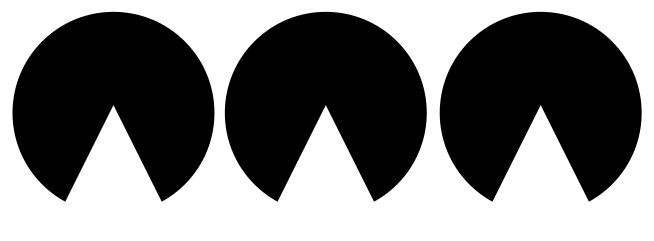This article is supposed to be about ‘education’ but some of it will read more like a science essay. The ‘education’ component is at the end of the article but one needs to know the science in order to understand an educational strategy that teaches children the concept of ‘synergy’ – one of which is to have children sing songs with harmonies.
On one of the earliest theories in psychology is ‘Gestalt psychology’. ‘Gestalt’ is a German word not easily translated but it approximates to the German word for ‘figure’. In psychological usage its meaning is closer to ‘whole’. Gestalt psychologists were interested in how we tend to make ‘figures’ and create ‘wholes’ through our perception and sensation.
For instance take these three objects like the ones in figure 1;

Figure 1.
If one takes care to arrange them as in figure 2, you may be surprised to see that now there are four objects even though nothing was actually added. It is still the same three objects and yet everyone can see the ‘fourth’ triangle.

Figure 2.
Many people swear that the ‘triangle’ is really there with triangle’s colour being ‘whiter’ than the same ‘white’ of the paper outside of the triangle.
What does that have to do with education? The answer is synergy. Synergy a term that can best be summed up by the phrase ‘the whole is greater than the sum of the parts’. This is one instance in which it’s probably easier to show, than to explain.
‘Synergy’ is going to be a prominent feature of the work that our children’s generation have to be competent in when they enter the workforce, but currently the ‘average’ school curriculum doesn’t acknowledge this as directly as it possibly should.
One way that it is acknowledged, is when a school’s educational programme promotes or encourages a holistic and integrated curriculum. Traditionally academic disciplines are taught as if they were hermetically sealed off from each other. Using this logic, poetry has little to with organic chemistry; quantum-physics has no pragmatic overlap with learning a second language; and budgets in accounting have nothing to do with typing skills in secretarial school. However, this is certainly not the case. For instance typists, could learn about budgeting of resources including effort and time (i.e. accounting, albeit not in dollars) enabling them to work ‘smarter’ rather than ‘harder’. Some languages appear to lend themselves better to understanding quantum physics than others (such as Navaho Indian versus English - go here half way down the article) because they are not so ‘serial’ and logical in their grammatical construction as others.
The demands of modern schools whose curriculum is assessed through rote learning of facts and figures, have a hard time teaching a holistic integrated curriculum. It can happen but curriculum designers need to work much harder to make this happen.
However, there is a more direct reason to teach synergy and that is that the concept is becoming far more important in every day life than ever before. I’ll focus on two: medicine and ecology.
Medicine
Most of us reading this article have been brought up to presume that the ‘Western’ style of medicine is ‘real’ medicine and everything else is at best, supportive and at worst, ‘snake oil’! This was all shaken quite dramatically in the 1950’s when epidemiologists and psychologists found a link between personality types and susceptibility to coronary diseases. This research demonstrated that ‘medicine’ requires a far greater understanding of simply ‘pathogens’ attacking the body. How our mind contributes to our health (or indeed our ‘dis-ease’) turns out to be probably as important as the actual medicine that we take (you may have heard of the associated ‘placebo’ effect). Despite being anaesthetised, medical studies have found that patients in surgery appear to pick up on the mood and conversations that the surgery staff have during their operation. Positive talk and ambiance is related to faster and more complete recovery than negative talk around the operating table. Modern medicine is gradually acknowledging that ‘health’ is far more than a cause (pathogen infection) and effect (becoming ill as a result of the pathogen) process. Instead the synergistic effects of our lifestyle including our mental state, are very important factors in determining who falls ill and who does not. Medical training is slowly changing to accommodate this new understanding.
Ecology
Pollution, climate change, rapid species extinction, invasive foreign species, monoculture agricultural practices as well as genetically modified crops, are but a few of the phenomena that we see impacting on the quality of our environment. Starting with Rachel Carson in the early 1960’s with her epoch-making book Silent Spring, we’ve come to learn that even if we are dyed-in-the-wool capitalist exploiters (as opposed to dyed-in-the-wool tree-huggers) and the environment becomes too inhospitable, then it affects human welfare. Just ask the residents of Japan’s north eastern coast who received a strong earth quake just of their coast and then a huge tsunami struck minutes later in early March of this year, or the residents of New Orleans that endured Hurricane Katrina in 2005. All the indications are that these events are going to be coming more frequently and more severely than before. An early warning system that allows us to adequately prepare for these disasters requires a science that works exclusively in the realm of synergy and that science is ecology. I would argue that the political administration of George W. Bush did not understand synergy and believed that the ‘parts’ of say pollution and global warming, are hermetically sealed off from job security in the USA. This was their rationale for pulling out of the Kyoto protocol that the previous administration had signed on. Their understanding was that job security was more important that environmental security and the two were interchangeable but not otherwise linked. Ecological understanding of the interconnectedness of the world makes us realise more than ever before that we all need to understand synergy extremely well if we are concerned about the medium to long term quality of life for all humanity.
How to teach synergy?
In other words it is of critical importance that our children understand the concept of synergy. However, we are still left in the dilemma of how to teach it. Most of us that deal with the concept, don’t really understand it until we’ve had practical experience of the ‘whole’ being greater than the ‘sum of the parts’. I’ve already mentioned that one way that this is done in many progressive schools, is to integrate the curriculum, so that ‘mathematics’ doesn’t just exist in the maths lesson, but in every lesson and academic topic.
We have begun to explore a more direct route through our singing programme. We were very fortunate to have an Australian Youth Volunteer work at our school for a year, who was herself a keen musician. We co-developed a programme that recognised that singing harmony is an instantly recognisable way to ‘hear’ synergy. Sing (or play) a single note and sustain it, let another sing (or play) a harmony to that original note and sustain it. Now a listener will hear not just the two notes together, but a third ‘voice’ that comes from the blend of the two notes in harmony. The sum of the parts (two voices or notes) is less than the whole (the two notes plus the ‘harmony blended’ note). People who sing in choirs will of course know exactly what is being described.
This is the audible version of the diagram I presented at the beginning of this essay where components arranged correctly can make another figure ‘emerge’ even though no additional figure is actually there. By teaching singing in harmony and melody, we believe that children will have a far more tangible appreciation of the concept of ‘synergy’. If they have this appreciation, then it becomes far easier to relate to synergistic effects in other parts of their learning such as the medical and ecological examples given above. In a very real sense, we believe that these children are singing for the future health of our citizens and indeed of our planet.